Inflammation. It's an essential process our bodies undertake to heal from injury and illness; however, it can become disastrous when chronic. When your body is in a state of chronic inflammation—commonly caused by a poor diet, stress, or lifestyle habits like smoking—it can lead to cellular damage along with an increased risk of weight gain, heart disease, and inflammatory conditions like rheumatoid arthritis.
One key way to beat inflammation is by maintaining or switching to a nutrient-dense diet. "Food is more than a meal, it is fuel for your body, and the type of fuel matters," says Kristen Carli, MS, RD, a nutritionist and writer for Fit Healthy Momma. "A balanced diet focusing on moderation and variety is key. Including fruits, vegetables, whole grains, healthy fats, herbs, and spices provides your body with the nutrients needed to fight inflammation."
Eat more fruits and veggies.
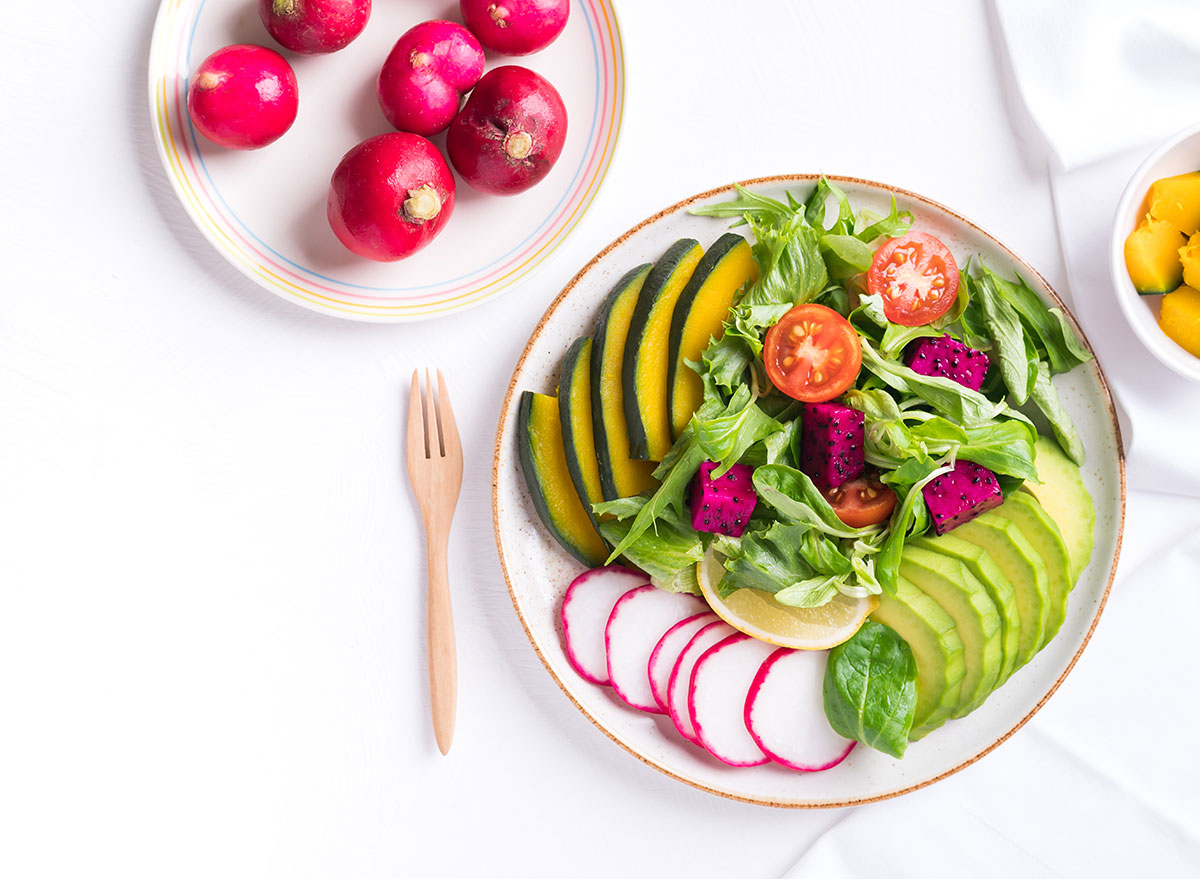
"Find creative ways to include more fruits and vegetables in your cooked meals," says Carli. "Try puréeing roasted eggplant into tomato sauce, make a turnip and potato mash instead of a traditional mashed potato, add mushrooms to your ground beef for burgers or meat sauces, etc."
When it comes to jazzing up your meals, Carli also recommends befriending healthy flavor enhancers. "Try using fresh herbs, spices, citrus juice, and citrus zest for dishes. The addition of these items increases phytochemicals which help combat inflammation while increasing flavor without adding more salt," she explains. "Try adding cinnamon and cloves to your morning oatmeal. Throw lemon juice in your salad dressing. Add orange zest to your baked goods." The possibilities are endless, so experiment as you please.
Drink green tea regularly.
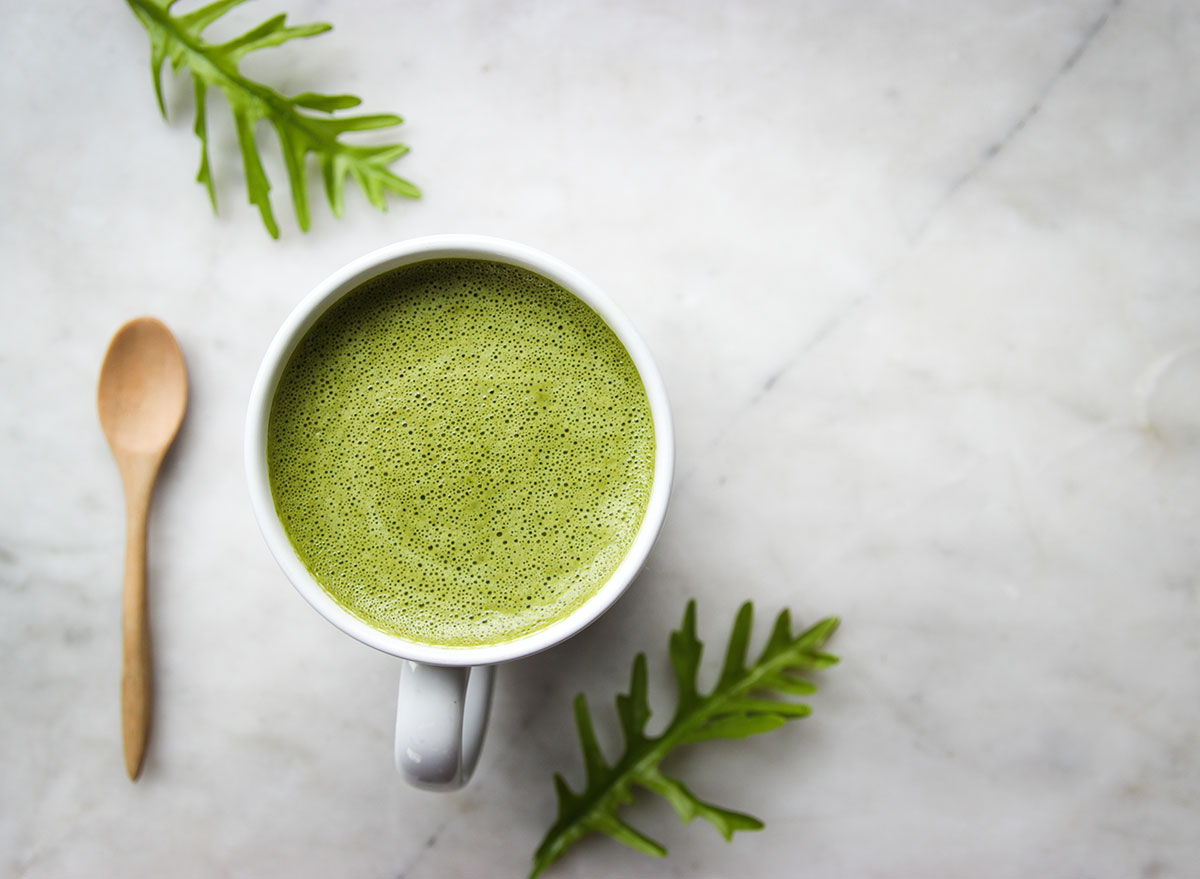
Keith-Thomas Ayoob, EdD, RD, FAND, a registered dietitian and Associate Clinical Professor Emeritus in the Department of Pediatrics at Albert Einstein College of Medicine, urges individuals to add some green tea to their diet. "The catechin compounds are potent anti-inflammatories, but they also may help reduce the risk for osteoporosis, according to this study," he says. "How? It seems green tea compounds help to slow down the demineralization of the bone. This is emerging research, but shows promise," he continues, noting that adding green tea is a good thing in any case, due to its high concentration of antioxidants and other anti-inflammatory compounds.
Eat walnuts.
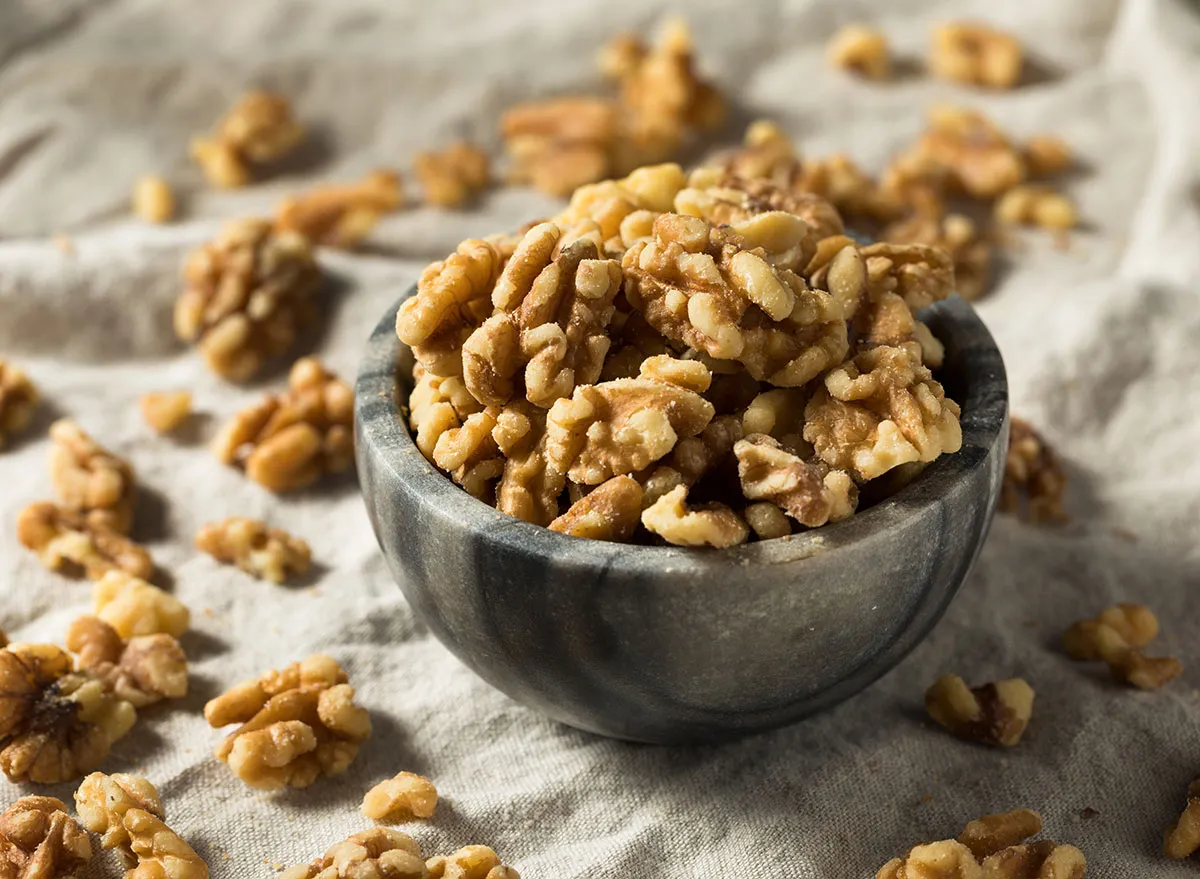
"They are an excellent source of plant-based omega-3 ALAs, and consuming these omega-3s can be beneficial for inflammation," explains Amy Gorin, MS, RDN, a plant-based registered dietitian in Stamford, CT, who is a nutrition partner with California Walnuts.
"In one study in Journal of the American College of Cardiology, people in their 60s and 70s who regularly ate walnuts achieved a significant reduction in inflammation (of up to 11.5%), compared to people who didn't eat walnuts," she continues, adding that the walnut eaters in the study ate about one to two ounces per day as part of their typical diet. "Lower inflammation levels may be connected with a lower risk of heart disease," she adds.
Eat some dark chocolate after a workout.
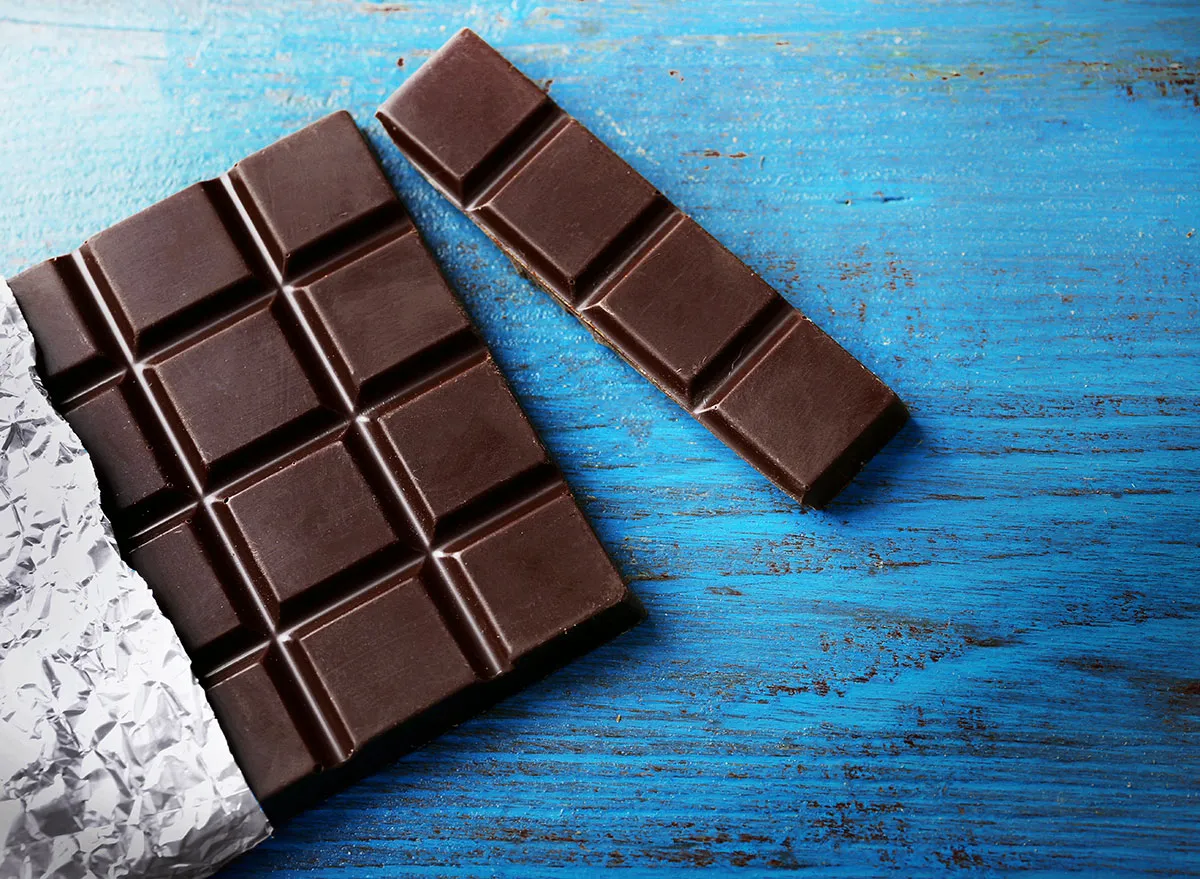
While Ayoob concedes this is emerging research, we'll take it. "Exercise-induced muscle damage is linked to inflammation, and this review of research on cocoa flavanols suggests that cocoa flavanols (a subclass of antioxidants) can help attenuate such muscle damage, including muscle soreness, and even help recovery of muscle function," he says.
"How much chocolate?" One of the reviewed studies used only 20 grams of dark chocolate, but another used just over 100 grams (I'd have volunteered for that group). Others took cocoa flavanol supplements. Most of the studies were short-term, so it can't be said chocolate is useful for treating muscle damage, but it's still a potent anti-inflammatory. And it has calories, so keep it to about a one-ounce portion, and the darker, the better, for the most antioxidants.
Embrace a Mediterranean diet.
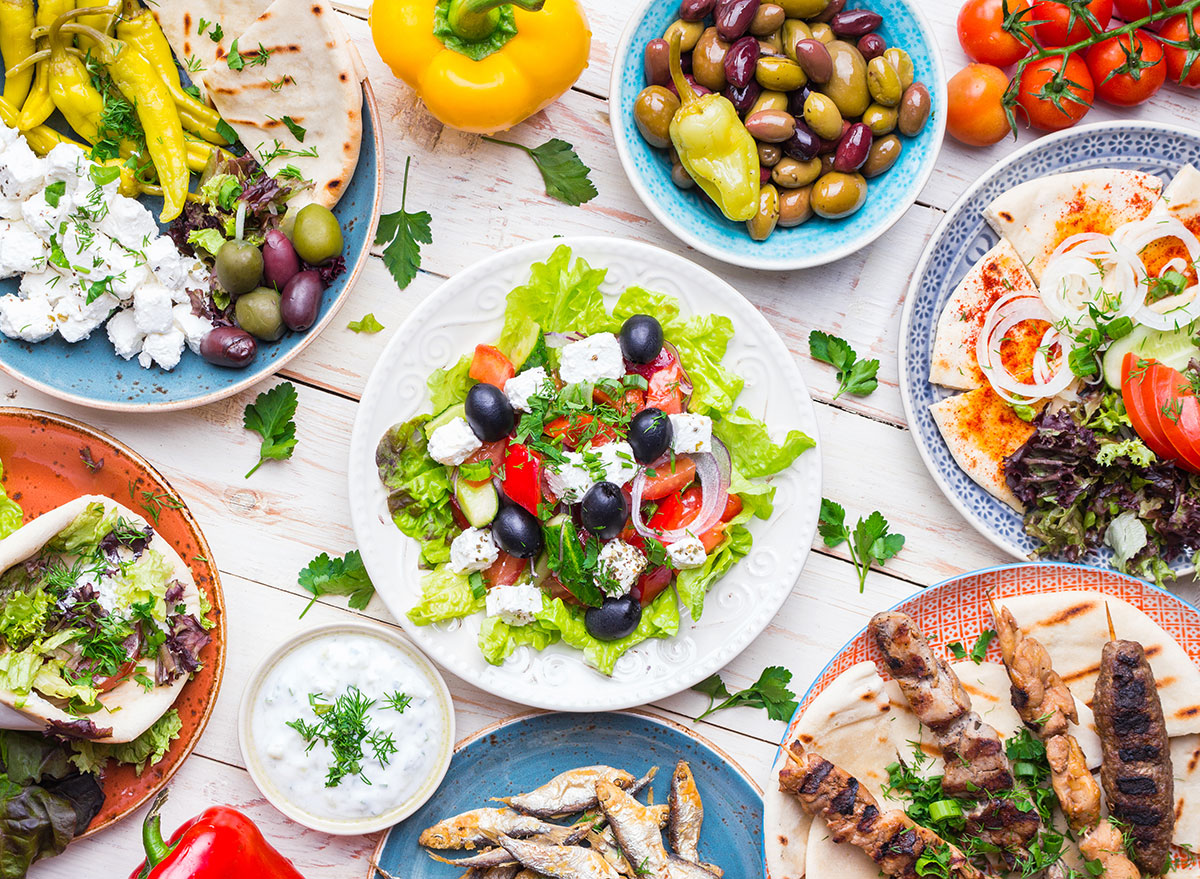
If Ayoob could get people to do one thing, it would be to eat their veggies (see tip #1!)—but also their nuts and extra virgin olive oil, other staples of this way of eating. "The Mediterranean-style diet is loaded with anti-inflammatory foods like these. Yes the veggies (and fruits) have lots of antioxidant compounds, but the nuts and EVOO are loaded with anti-inflammatory monounsaturated fats," he says. "This review of the research showed the Mediterranean Diet lowered inflammatory markers and markers of oxidative stress," he says, adding that this dietary pattern can be adapted to pretty much any cuisine, such as Asian or Indian, making it versatile.
"Nuts and veggies are present in so many cuisines, and canola oil is a good substitute for EVOO, as it has a fairly similar amount of monounsaturated fats," he adds.
Drink coffee.

Hallelujah. "Yup, I'm telling you to do something you probably already love doing. Coffee contains antioxidants, which provide anti-inflammatory benefits," says Gorin. "And coffee actually contains more antioxidants than wine and tea, according to a study in Antioxidants." Of course, like anything, drinking coffee in moderation is probably best for your health—and so you're not a jitter machine. This article gives you a solid overview of the health benefits of coffee.
Eat turmeric regularly, or consider a turmeric supplement.
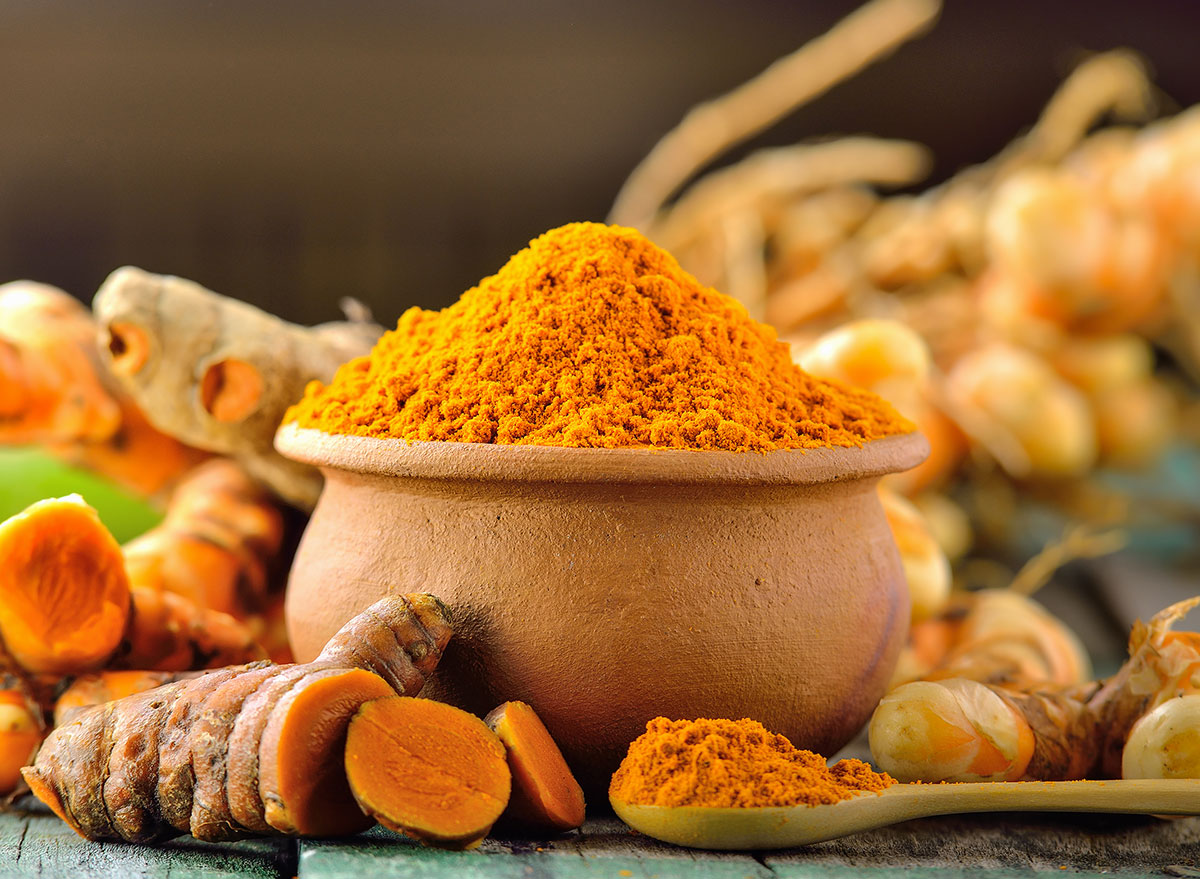
"Curcumin, which gives turmeric its bright color and flavor, is also known for its anti-inflammatory effects on the body. Studies show that curcumin can inhibit and reduce proinflammatory factors in the body," says registered dietitian Angela Houlie, MS, RDN, CDN, founder and owner of My Fruitful Body Nutrition, PLLC. "Oxidative stress triggers chronic inflammation, and curcumin has been shown to alter the pathway that causes the oxidative stress. Many new highly potent formulas of curcumin are now being created to increase its efficacy in fighting off inflammation."
If buying fresh turmeric, Houlie says always purchase authentic Indian turmeric for cooking and for supplements, look for one with as few fillers and inactive ingredients as possible.
Start your day with some OJ.

Not just because it tastes great, friends. "Some research shows that flavonoids found in 100% orange juice may be able to reduce inflammation and support health of blood vessel cells," says registered dietitian Lauren Manaker MS, RDN, LD, a member and partner with the Florida Department of Citrus. And according to one study published in Food and Nutrition Research, consuming 750 milliliters of orange juice for eight weeks as part of the usual diet was associated with improvements in several anti-inflammatory and oxidative stress markers in adults.
Manaker cautions people to ensure they're drinking 100% orange juice, versus a blend, which may have added sugars and other icky ingredients.
No comments:
Post a Comment